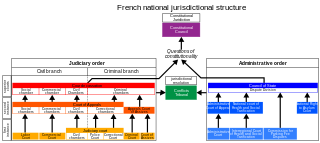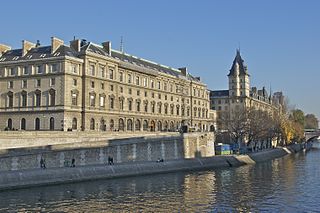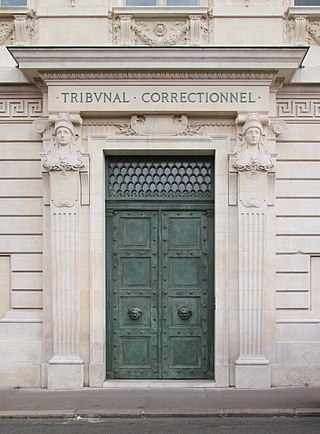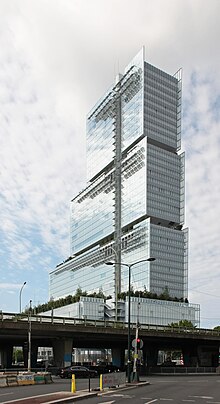
Law enforcement in France is centralized at the national level. Recently, legislation has allowed local governments to hire their own police officers which are called the police municipale.

French law has a dual jurisdictional system comprising private law, also known as judicial law, and public law.

Quebec law is unique in Canada because Quebec is the only province in Canada to have a juridical legal system under which civil matters are regulated by French-heritage civil law. Public law, criminal law and federal law operate according to Canadian common law.

The Direction régionale de la police judiciaire de la préfecture de police de Paris, often called the 36 quai des Orfèvres or simply the 36 (trente-six) by the address of its headquarters, is the seat of the Paris regional division of the Central Directorate of the Judicial Police. Its 2,200 officers investigate about 15,000 crimes and offences a year.
In the French penal code, murder is defined by the intentional killing of another person. Murder is punishable by a maximum of 30 years of criminal imprisonment . Assassination and murder in some special cases in accordance with Article 221-4 ) are punished by a jail term up to life imprisonment. The same punishment is given to murder committed in connection to other criminal offenses according to Article 221-2.

The French Commission on renewal and ethics in public life, nicknamed Jospin commission, was a think tank established in 2012 by President François Hollande to provide reforms in public life.

In French law, the ministère public or le parquet is the authority charged with defending the interests of society and of the application of law. It is primarily made up of magistrates, but is sometimes represented by other persons such as police officials. Its magistrates can be referred to as "standing" magistrates, as opposed to magistrats du siège. Its closest equivalent in some English-speaking countries is the director of public prosecutions and the attorney general in others.

In France, a cour d’appel of the ordre judiciaire (judiciary) is a juridiction de droit commun du second degré, an appellate court of general jurisdiction. It reviews the judgments of a tribunal judiciaire. When one of the parties is not satisfied with the trial court’s judgment, the party can file an appeal. While decisions of a court of first instance are termed "jugements" in French, a court of appeals hands down an arrêt, which may either affirm or reverse the judgment of the court below. An arrêt (judgment) of the court of appeals may be further appealed en cassation. If the appeal is admissible at the cour de cassation, that court does not re-judge the facts of the matter a third time, but may investigate and verify whether the rules of law were properly applied by the lower courts.
A police court in France is a criminal court which judges all classes of minor offenses (contraventions ) committed by adults. More serious offenses are judged by a correctional court for délits, or by a cour d'assises for a serious crime.

In France, the correctional court is the court of first instance that has jurisdiction in criminal matters regarding offenses classified as délits committed by an adult. In 2013, French correctional courts rendered 576,859 judgments and pronounced 501,171 verdicts.
TheCode pénal is the codification of French criminal law. It took effect March 1, 1994 and replaced the French Penal Code of 1810, which had until then been in effect. This in turn has become known as the "old penal code" in the rare decisions that still need to apply it.
The Penal Transaction Law is a Belgian law that allows a court to end a public prosecution in exchange for the payment of a sum of money. The law is often enacted to expedite trials where a successful prosecution is in doubt, or in cases that are likely going to be lengthy and protracted, or are at risk of being delayed. The settlement does not equal a conviction, and does not appear on the criminal record of those under investigation. Under article 2046 of the Civil Code, the right to propose a settlement rests exclusively with the Public Prosecutor at any time during the proceedings.

The Ministry of Justice is a ministerial department of the Government of France, also known in French as la Chancellerie. It is headed by the Minister of Justice, also known as the Keeper of the Seals, a member of the Council of Ministers. The ministry's headquarters are on Place Vendôme, Paris.

French criminal law is "the set of legal rules that govern the State's response to offenses and offenders". It is one of the branches of the juridical system of the French Republic. The field of criminal law is defined as a sector of French law, and is a combination of public and private law, insofar as it punishes private behavior on behalf of society as a whole. Its function is to define, categorize, prevent, and punish criminal offenses committed by a person, whether a natural person or a legal person. In this sense it is of a punitive nature, as opposed to civil law in France, which settles disputes between individuals, or administrative law which deals with issues between individuals and government.
A criminal proceeding in French law is one carried out in the name of society against a person accused of a criminal offense by applying the French penal code. It is taken in the name of society, in that its goal is to stop disruption of public order, and not to abate personal damages done to a specific person, which is governed by French civil law.
The judicial police in France are responsible for the investigation of criminal offenses and identification of perpetrators. This is in contrast to the administrative police, whose goal is to ensure the maintenance of public order and to prevent crime. Article 14 of the French Code of Criminal Procedure provides the legal basis for the authority of the Judicial police.
French criminal procedure focuses on how individuals accused of crimes are dealt with in the French criminal justice system: how people are investigated, prosecuted, tried, and punished for an infraction defined in the penal code. These procedural issues are codified in the French code of criminal procedure. It is the procedural arm of French criminal law.
This glossary of French criminal law is a list of explanations or translations of contemporary and historical concepts of criminal law in France.
Jurisdictional dualism in France is the separation of the French court system into two separate divisions, or "ordres", as they are called in French: the ordinary courts, and the administrative courts. The ordinary courts, also known as the judiciary order, handle criminal and civil cases, while the administrative courts handle disputes between individuals and the government. This dual system allows for a clear separation of powers and specialized handling of cases related to the actions of the government. The administrative courts are headed by the Council of State, and the ordinary courts by the Court of Cassation for judiciary law.
The French code of criminal procedure is the codification of French criminal procedure, "the set of legal rules in France that govern the State's response to offenses and offenders". It guides the behavior of police, prosecutors, and judges in how to deal with a possible crime. The current code was established in 1958, and replaced the code of 1808, created under Napoleon.















